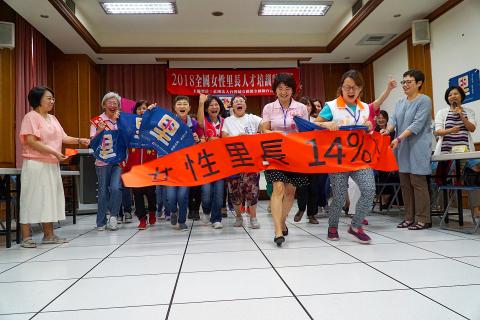Women’s groups yesterday said they hope that more women would be elected as borough and village wardens at the nine-in-one local elections on Nov. 24.
Women hold about 14 percent of the nation’s 7,000 borough and village warden positions, the National Alliance of Taiwan Women’s Associations told a news conference in New Taipei City’s Banciao District (板橋).
This is despite the nation having already elected its first female president, while about 38 percent of legislators and one-quarter of city and county councilors are women, alliance chairperson Chen Hsiu-hui (陳秀惠) said.

Photo: CNA
Although the majority of community service and volunteer work is performed by women, they are often hesitant to vie for leadership roles, Chen said.
The alliance encourages women in local communities to run for borough or village warden, and groups are there to offer support, she said.
The alliance said it held training sessions in July and last month throughout the nation for potential female warden candidates to increase the proportion of female leaders and in local communities and to support them.
This month, it hosted training sessions for female candidates, it said.
The alliance said it hopes that the proportion of female wardens would surpass 14 percent after the elections on Nov. 24, while it aims to reach 20 percent.
Chen said she hopes that once female wardens are elected, they would transcend party lines and act as professional community workers and managers.
They would bring the values of social welfare and civil groups into their communities and create environments that are more friendly and livable, Chen said.
At the news conference, female candidates across the nation broke through a banner that said: “Female borough wardens, 14 percent.”
Several women’s groups, including the Homemakers United Foundation, the Peng Wan-ru Foundation, the Taipei Women’s Rescue Foundation, the Awakening Foundation, the Society of Taiwan Women in Science and Technology, the Taipei Awakening Association and the Kaohsiung Women Awakening Association, also attended the event.

The Ministry of Economic Affairs has fined Taobao NT$1.2 million (US$36,900) for advertisements that exceeded its approved business scope and ordered the Chinese e-commerce platform to make corrections in the first half of this year or its license would be revoked. Lawmakers have called for stricter supervision of Chinese e-commerce platforms and more stringent measures to prevent China from laundering its goods through Taiwan as US President Donald Trump’s administration cracks down on origin laundering. The legislature’s Finance Committee yesterday met to discuss policies to prevent China from dumping goods in Taiwan, inviting government agencies to report on the matter. Democratic Progressive Party

Taiwan and its Pacific ally Tuvalu on Tuesday signed two accords aimed at facilitating bilateral cooperation on labor affairs, according to Taiwan’s Ministry of Foreign Affairs (MOFA). The governments inked two agreements in Taipei, witnessed by Foreign Minister Lin Chia-lung (林佳龍) and visiting Deputy Tuvaluan Prime Minister Panapasi Nelesone, MOFA said in a news release. According to MOFA, the agreements will facilitate cooperation on labor issues and allow the two sides to mutually recognize seafarers’ certificates and related training. Taiwan would also continue to collaborate with Tuvalu across various fields to promote economic prosperity as well as the well-being of their

Taiwan would welcome the return of Honduras as a diplomatic ally if its next president decides to make such a move, Minister of Foreign Affairs Lin Chia-lung (林佳龍) said yesterday. “Of course, we would welcome Honduras if they want to restore diplomatic ties with Taiwan after their elections,” Lin said at a meeting of the legislature’s Foreign Affairs and National Defense Committee, when asked to comment on statements made by two of the three Honduran presidential candidates during the presidential campaign in the Central American country. Taiwan is paying close attention to the region as a whole in the wake of a

NEW WORLD: Taiwan is pursuing innovative approaches to international relations through economics, trade and values-based diplomacy, the foreign minister said Taiwan would implement a “three-chain strategy” that promotes democratic values in response to US tariffs, Minister of Foreign Affairs Lin Chia-lung (林佳龍) said. Taiwan would aim to create a “global democratic value chain,” seek to capitalize on its position within the first island chain and promote a “non-red supply chain,” Lin was quoted as saying in the ministry’s written report to the Legislative Yuan submitted ahead of the legislature’s Foreign Affairs and National Defense Committee meeting slated for today. The Ministry would also uphold a spirit of mutual beneficial collaboration, maintaining close communication and consultations with Washington to show that Taiwan-US cooperation